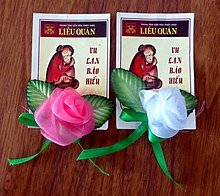Wandering Souls Day
The Day of the Wandering Souls ( Vietnamese Tgut Trung Nguyên ) is a festival of forgiveness that is celebrated in Vietnam to commemorate the ancestors and their wandering spirits. Tết Trung Nguyên falls on the 15th day (full moon day) of the 7th lunar month. The festival is an integral part of Vietnamese culture because on this day the Vietnamese commemorate their deceased and show their gratitude to their ancestors and parents. They hold prayers for their deceased and other souls to dispel any unjust allegations against them and to help them lead a good life in the otherworldly world of Buddha . Although it is a Buddhist festival, it is not limited to Buddhists only, but is celebrated by all Vietnamese who believe in the existence of the Almighty: in houses, industrial plants, business units and government buildings, as well as pagodas.
On the full moon day of the seventh month, Vietnam also celebrates the Vu Lan festival, the festival of filial piety. The two celebrations are not the same, but symbolize love and gratitude for one's own parents as well as voluntary sharing as a person.
origin
The festival of the wandering souls originally stems from an ancient Vietnamese belief. This assumes that the soul of a deceased person goes through a procedure in which the judgment is made as to whether his soul, depending on the behavior of the person in the world of the living, is sent to heaven or to hell. If the person is judged to be evil, they go to Hell, but on Tết Trung Nguyên all souls are set free for some time after the sun goes down. Then these souls go to their homes in search of food, and those who no longer have relatives wander desperately in search of food and love.
However, the souls of the deceased can still do good in the underworld and make up for bad deeds. At the same time, the living can do something for the souls of the dead with rituals like those that take place on this day.
Vu Lan, the festival of filial piety, which is celebrated on the same day, has its origin in the legend of the Arhat Đại Mục Kiền Liên or Mục Liên ( Moggalana ), who was one of the two main disciples of the Buddha alongside Sariputta . Mục Liên was known for his supernatural powers. After Mục Liên rose from bhikkhu to arhat , he used his all-seeing eye to look for his dead mother in the underworld. When he saw that she was a ghost in the realm of hungry spirits and was tormented by hunger because she had done a lot of evil and was greedy during her lifetime, he brought her a bowl of rice. But the rice turned to liquid fire when she tried to eat it. Mục Liên asked the Buddha how he could free his mother. Buddha explained to him: He could not save his mother alone, but only with the help of all Buddhists who come from the ten cardinal points. And only the 15th full moon day of the seventh month is suitable for asking for this help with Buddhist offerings. Mục Liên did exactly the same and his dead mother was allowed to leave the world of hungry spirits.
Manners
In popular belief, the seventh month is also called the ghost month, because in this month the gate of the underworld is opened and the "homeless, familyless" spirits and souls of the dead are allowed to come to earth. Vietnamese believe that the ghost month is an unlucky month, which is why one should pay attention to many taboos, eat vegan and help others voluntarily, so do not kill and give a lot.
At Tết Trung Nguyên, the souls come to their graves or family altars, where they are received by the living with special dishes, incense sticks and burnt-out votive paper made of gold and silver. The souls who have no more descendants or who have been forgotten by their descendants gather at the temples. Offerings are brought to temples and the Buddhist devotees take part in a ceremony. One prays to Buddha and asks for his blessing for happiness and the well-being of all family members as well as for a good life for souls in the other world. Then the believers, whose mothers have already died, are given white roses, and everyone else is given red or pink roses. This tradition was started by a Buddhist monk, Thích Nhất Hạnh , in 1962.
Huge buffets are prepared in the open air for the wandering spirits: all kinds of delicacies such as meat, fish, rice, corn, salt, candies and cakes made from rice flour. According to the imagination of the Vietnamese, the festival of the wandering souls is a day on which the living and the dead meet in thought.
See also
Individual evidence
- ↑ Numerous events for the Vu Lan festival . In: The Voice of Vietnam . August 21, 2013 ( vovworld.vn [accessed November 26, 2018]).
- ↑ a b c Tet Trung Nguyen (Festival of Wandering Souls) in Vietnam - Travel to Vietnam . In: Traveling To Vietnam . July 24, 2012 ( reisennachvietnam.net [accessed November 26, 2018]).
- ↑ a b c d The origin of the Vu Lan festival (Sự tích ngày lễ Vu Lan) . ( thoibaovietduc.com [accessed November 26, 2018]).
- ↑ a b Kerstin Probiesch: Vu Lan or Tet Trung Nguyen- festivals of religions. Retrieved November 26, 2018 .
- ↑ 25.08.2018 Vu Lan - Vietnam's Mother's Day | Vietnam travel & information portal. Retrieved November 26, 2018 .
